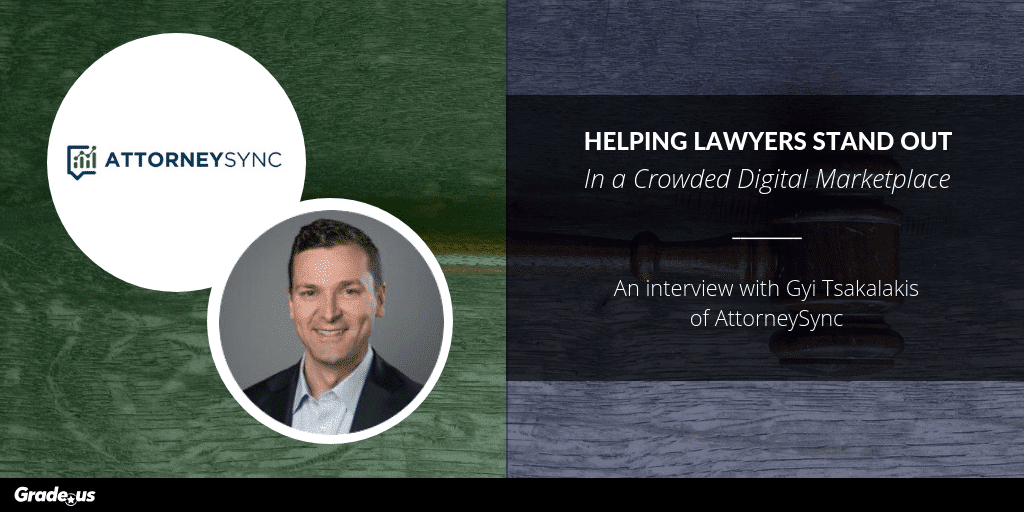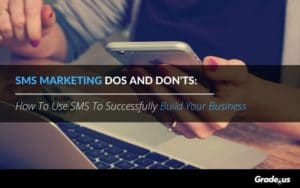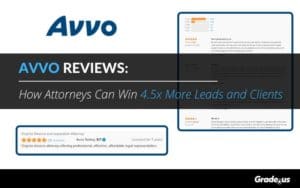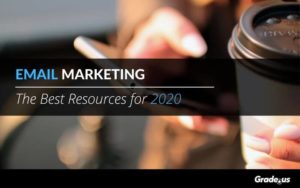As a former lawyer himself, Gyi Tsakalakis knows a great deal about the challenges law firms face. That's why his company, Attorney Sync, helps law firms and only law firms.
In addition to helping lawyers rank, Gyi writes for Avvo's Lawyernomics, for Lawyerist, and for Attorney at Work. He is the co-host of the Clienting podcast. And he was kind enough to sit down with me to share some of his insights with Grade.us readers.
On the digital marketing landscape for lawyers and Google My Business spam
Carmen: When we're talking about digital marketing in the legal industry, what would you say the biggest changes have been over the past couple of years?
Gyi: Well, most recently the biggest challenge that we've had is this Google My Business spam problem. Spam in local for lawyers has been a problem for awhile, but recently there's been a huge uptick, and so that's probably the biggest issue going on right now.
Carmen: Is that fake review spam?
Gyi: The big uptick has been in fake business listings. Fake reviews are a problem too, but something's going on with these lead generation companies where they are finding ways to massive upload hundreds of fake listings overnight, and Google is really struggling to combat the problem.
I'm not sure who the companies are behind these, but basically what they're doing is they're selling leads to lawyers. One of the ways they're generating the leads is through creating fake GMB listings.
Carmen: So how are you helping your lawyers with that?
Gyi: For us, it's been a very interesting time, because part of the service we offer is reporting fake listings.
If our client is in an area where there's been an influx of fake listings, we'll help try to remove some of those fake listings, which in theory will help increase visibility for our clients.
On which law firms are succeeding in digital marketing
Carmen: What types of law firms would you say are succeeding online right now?
Gyi: The way that I like to say it is the ones that are really mindful that the practice of law is still a reputation and relationship business, but they're finding ways to use communications technology to enhance, promote, and otherwise publicize their reputation and relationships.
I think the ones that are surviving in the future are using technology, but are keeping in mind that at the end of the day, people still tend to hire lawyers they know, like, and trust. So it's not a technology vs. traditional notion of reputation or relationship, it's using technology to better support those traditional notions.
On law firms that are just starting digital marketing
Carmen: If you have a law firm that's got just minimal digital presence right now, or has just decided to invest in digital marketing very recently, what would you say their number one priority should be?
Gyi: That's always a tough one.
Right now, I'm on the Google My Business bandwagon. I think that for better and worse, Google is still the primary access point for people on the internet. So regardless of how someone gets a lawyer's name, they're likely to go online and search for information about the lawyer.
Most of those searches are going to be performed at Google, so it makes sense to be in control for what Google shows for searches on your name and your firm name.
Spending time making sure you're completing my GMB listing, make sure you're adding testimonials if it's permissible in your state, video testimonials we've seen a lot of success in, using client testimonials in your posts and various other messaging through the posts feature in GMB is really effective, being mindful of what's in your Q&A, and then obviously encouraging happy clients to sing your praises in your GMB profile in the form of reviews.
Carmen: Are you less focused on them building websites because you're more focused on GMB? Or is it a hand-in-hand sort of thing?
Gyi: Hand-in-hand! So, you know, since you asked me, one I would say Google My Business, but a very close second, almost a 1, is still the website, right?
Getting somebody to your website and making sure the website is the focal point of your marketing online is still very important. If you pushed me to say, "website or GMB?" Unfortunately I'd probably be inclined to say GMB, because you get a lot more visibility for that Google search result.
But that's not to say in my opinion, it's not less important to have a website. It's very important to have a website. Obviously there are all sorts of additional functions you can do with your website that GMB doesn't provide. Retargeting comes to mind off the top of my head.
But getting people back to your website, getting people to engage with your website, is very, very important in today's online marketing climate.
On the importance (or lack thereof) of links in SEO
Carmen: So one thing you've said that's controversial among marketers is, "Meh, links!" What's the thought process and your perspective on link building in the legal industry?
Gyi: Well, I'm very honored you brought that up. It's apparently turning into a Thing.
Really, how it started was...it's not to diminish some of the other things that go into ranking and search results, right? We're very keen to things like structured data, site speed, architecture, on-page optimization and all that kind of stuff.
But, more and more, in my experience, those are becoming table stakes.
Everybody can do that.
Everybody can update their page titles. Everybody can add structured data to their site, everybody can do things to improve site speed.
The competitive difference makers, as my friend Darren Shaw likes to say in the Local Search Ranking Factors Survey, to me, in my experience, are links. Links move the dial. The reason "meh, links" came up because every time I hear someone talking about the demise of links, or links are not as important as they used to be, or something else is the new, shiny hotness, I always remind people that at the end of the day, Google is still a link-based search engine, and I think you're hard-pressed to argue in competitive spaces like in legal that you can have a lot of success for visibility on competitive queries without a quality backlink profile.
On the qualities of a good legal industry client
Carmen: When a lawyer chooses to work with a digital agency, what can they do to be a good client?
Gyi: Great question! So, the biggest thing is to be really more of a partner. So many firms, and I get it, lawyers are busy, but so many firms think they can just set it and forget it. Turn things over to their marketing agency and then come back months or years later and see what's been going on.
It's really very ineffective, and it's kind of dangerous. If you're not holding your agency accountable and making final approval on content. Lawyers are subject to their state's rules on professional conduct and professional responsibility.
So a lot of agencies aren't familiar with those rules, and they'll go out and do stuff on behalf of the law firm that could get the law firm in trouble with their state bar. Even if that's not the case, at the less harmful end of the spectrum, just wasting money on stuff that's not really working.
So, define success from the start, build in the metrics, your marketing objectives in terms of what's important to your law firm as a business, don't get caught up on indirect, fuzzy marketing metrics.
Focus on things like return on investment, return on ad spend, hitting a target cost per client or at least a target cost per lead.
I think the firms that work with agencies that take that partnership approach, that are engaged with the process, tend to have a better experience working with agencies.
Carmen: What are some of these fuzzy metrics?
Gyi: Things like follower counts, or likes, or the types of stuff agencies will tend to put in reports that don't really have meaning to meeting the objective.
Look, if the campaign is around building awareness, and building engagement, and that's a valid marketing objective for your firm, then great.
But at the end of the day you can't pay your rent in likes and followers, and so I always say try to focus on the direct business metrics that have the most meaning for your practice.
On what law firms should look for when evaluating digital marketing agencies
Carmen: When a lawyer is searching for a marketing agency or vetting digital marketing agencies, what should they be aware of, what should they look for when considering whether this is someone they should even consider working with, what are some of the promises that a lot of people in your space make they should run away from?
Gyi: Another great question. So for me, there's no substitute for getting examples of prior work. So, case studies.
Asking for recommendations from other lawyers that have worked with the agency. There's really just no substitute for actually talking to people on the ground who have worked with another agency to get their experience.
I think also a lot of lawyers will do a search on their category name.
So if they're a personal injury lawyer in Chicago, they'll search for Chicago personal injury lawyer, they'll see who comes up organically in the #1 spot, they'll scroll down to the bottom of the page and they'll look at the marketing agency who built their site and is doing their marketing.
That seems like a great idea! They're making that site rank, so maybe they'll make my site rank.
The problem is, there's only so many spots in a search result that actually get any kind of meaningful attention.
So our big thing is, "Know whether or not your agency is working with a competitor." Ask questions about what other firms in the area are they working with, especially if they're in the same practice area. Make them commit to some sort of exclusivity so they're not working with 30 personal injury firms in your same area.
Because at the end of the day, you can't get all of those sites to rank for the same keywords. They're competing. That's an inherent conflict to us, and it's something we think lawyers should be cognizant of.
The other big one that comes up a lot is: make sure you own all of your data, your accounts, your content, your content management system. So many lawyers are just renting their content and data and Google Ads account from their marketing agency.
If they decide to make a switch, they lose all that data.
Our position is lawyers should own all their marketing data and all the work product their agencies produce for them. So that's another really important question for folks to ask.
On the challenges for lawyers in high density, highly competitive areas
Carmen: Now you just mentioned those high-density areas like Chicago. How can lawyers stand out if they're in one of those areas that has that much competition?
Gyi: I think this comes down to the strategy.
Firms are so different. If you're a brand new firm and you're trying to get business in the short term, probably trying to compete for head terms in a competitive marketplace in search, whether it's paid or organic, is probably not your best starting point.
One of the things we talk about is to go through the process of understanding what you do that's actually unique, how can you stand out from the traditional unique selling proposition or unique value proposition.
For example, if you're a young lawyer, you're not going to be able to distinguish yourself based on experience. But you might be able to distinguish yourself on tech savviness or some kind of efficiencies that can make you more appealing.
One that comes up all the time for younger lawyers who tend to be digital natives is they can provide services in a much more streamlined and efficient way than some of the more established firms, because of the cost of making the switch.
So they might do things like have documents and online document signing so clients don't have to come in.
So finding ways to really distinguish yourself, to make yourself really unique, and provide value and delight and efficiency to clients, those are the things that are going to help you stand out. So building a brand around that. Making sure you're putting that on your website, making sure that comes across in your communication really is essential.
I think too many firms tend to get into this trap of thinking, "Well, people only search for Chicago Personal Injury lawyers, so I need to rank there, I need to dump a bunch of money into that."
The truth is businesses look up searches, like that which are modified by practice area and geography, are actually only a very small segment of total search. And while they are very low-funnel, meaning there's a high intent there, there's a whole other world of people doing research, asking questions, long-tail and I think that's an opportunity for firms. Depending on what your strategy is, to take advantage of.
On reputation and review management in the legal industry
Carmen: One thing that's a challenge for lawyers is online reviews. What types of strategies have you seen be most successful for them?
Gyi: That's a great question too.
So the first thing I always tell people is you can't systematize your way out of bad service. In order to get reviews, this will sound silly, but you actually have to be providing a remarkable experience to your clients so that they actually want to leave you a review.
Then it becomes systems, processes, using tools, to motivate them and make that experience easier.
I always say focus on the experience first, then think of the processes, systems, and tools.
Timing is a big factor too. When you send that request or when you make that request to a happy client for the review, think about doing that at times when they're most likely to be engaged with that process.
In a certain context, that may be when they get their settlement check or when the representation ends. The other thing I always tell lawyers is to think about ways to motivate people to leave you a positive review that aren't necessarily your clients.
So maybe you do some speaking, you conduct a seminar, maybe you teach. Maybe you're active with an organization in your community. Most of the platform guidelines say things like it has to be a genuine experience with the business. So my interpretation of that is anyone who has a genuine experience with the lawyer in a professional context is a candidate for leaving a happy review.
One of the things that comes up all the time is, "Well I'm a criminal defense lawyer and my clients don't want to go on and say, 'thank you for getting me acquitted for my DUI,' right?" But there are all sorts of ways you can get people to leave reviews for you that don't speak to those specifics of the representation. The other thing, too, is it doesn't need to be outcome specific.
I would tell lawyers to encourage their clients and give them examples of testimonials that speak to things like, 'they were always there to answer my questions,' 'they were responsive to my phone calls.' That kind of service component can help relieve some of the friction clients might have from actually leaving a review.
Again, it's for those next clients. What those next clients care about is what it's like to work with you, what kind of human being you are, how you treat your clients, and so those service-based reviews can really be even more effective than outcome based reviews.
On the future of digital marketing in the legal industry
Carmen: And finally, how do you predict the legal industry is going to change when it comes to digital marketing over the next couple of years? Are there some trends you're seeing that law firms should be taking advantage of?
Gyi: Yeah, I think like in many other businesses, building email lists for people that want to get communications from you via email is going to continue to grow in importance. I think that people are, in the grand scheme of things, social. Social media and the way we use the internet is still fairly young.
I think we're going to see a lot of users of social media and the internet changing the way they're using that, doing a lot more filtering, doing a lot more curation of their feeds.
Lawyers who are out there hammering people with advertising messages on social platforms, I don't think they're going to be as effective down the road.
But those who are providing value, getting opt-in permission for email lists, so you can build custom audiences and really tailoring messaging to a target audience at the right time with the right message...those are the ones who are going to win in the long run.
At the end of the day, you have to put stuff online that people actually want to consume.
That's the best way to stay top-of-mind and be in that consideration set when they're actually in need of a lawyer.
On improving email marketing for clients of law firms
Carmen: I lied, I have another question now that you've answered this one. So, I mean, I've had a couple of lawyers. I went and I did what I needed to do with them and I never talked to them again. So what kind of email list do people get from lawyers that get read?
How are lawyers doing that?
Gyi: That's a great question.
So one of the things we like to think about, and this is one of the great untapped resources for law firm client development, is former clients.
So, just like you described, too many lawyers tend to think, "Oh I represented the client and now I'm never going to talk to them again."
One thing you might consider as a lawyer is to just put them on a list. Sending them an email or maybe Labor Day or Happy New Year or their birthday, or some kind of other check-in with them.
Again, not in a newslettery, marketing, free consultation manner. Just like a regular email, like you would just to stay in touch with a professional contact. I think that can be effectively implemented through email automation, but it's gotta come across as authentic. You have to be engaged with it.
If a client responds to that message, you'd better be prepared to engage with it and respond to that conversation. That's the kind of stuff that we see where the open rates are a lot higher, the click through rates are a lot higher, the conversation rates are a lot better. That's just one way, and that's just kind of off the cuff, finding ways to stay in touch with former clients that aren't marketing, they're nurturing of that relationship.
That goes back to what we talked about earlier. Lawyers that find ways to use technology automation, social media, the internet to create, solidify, and nurture their professional relationships are the ones that are going to continue to have success.
You can catch up with more of Gyi's insights by visiting his site here.
About the Author
Raney C. Hudson
Raney C. Hudson is an independent content consultant with a 10+ year track record in the digital marketing industry.











